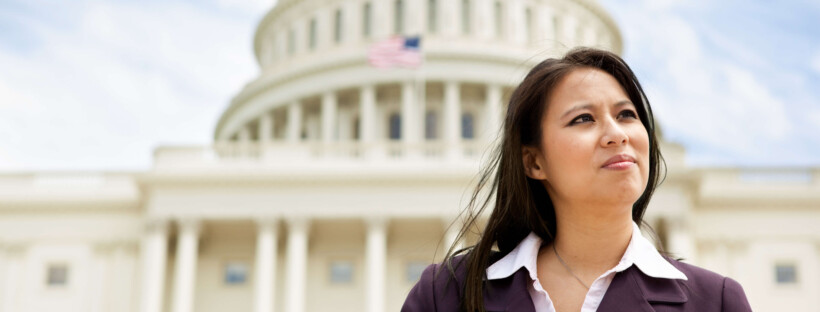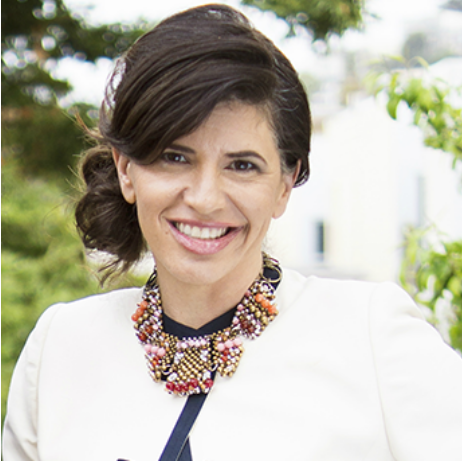Helping Girls Find Their Political Voice

On November 8, 2016, thousands of young women currently attending or recently graduated from girls’ schools across the country will be a part of history in more ways than one. They will be of eligible voting age for the first time, giving them the opportunity to help elect the next president of the United States. These young women will see a woman’s name listed on the ballot as a major party candidate for the first time in U.S. history.
In 2020, we will celebrate the 100th anniversary of the 19th Amendment to the U.S. Constitution, which granted American women the right to vote. When we celebrate this milestone, it is possible we will have a woman in the White House as president.
As historic as this election is, we still have a long way to go. Women make up 51% of the population, but hold only 22% of the 500,000 elected offices in the United States. In order to have equal representation at every level of government, we need 140,000 more women in office.
Girls’ schools help girls develop their voices. In particular, their political voices. In fact, girls’ school graduates are 12% more likely than their peers from coed schools to have a political discussion with friends. They also find it essential to keep current with the political scene. Girls’ schools are in a prime position to help plug the leaky political pipeline just as they are doing for women in STEAM.
Like girls’ schools around the world, IGNITE is an organization dedicated to helping young women develop and use their political voice. I recently had the opportunity to speak with IGNITE’s founder and president Anne Moses, who is an alumna of The Nightingale-Bamford School and an adjunct faculty member at the women’s college Mills.

Anne Moses, Founder and President of IGNITE
Q: Tell me a little bit more about IGNITE. What is the organization’s mission?
A: IGNITE is building a national movement of young women who are ready and eager to become the next generation of political leaders. We have programs for high school girls and college women that provide civic education, exposure to women in civic and political leadership, hands-on training opportunities, and a peer network of women who support and nurture each other’s aspirations. We are also working to shift the culture to one that’s more actively encouraging young women to declare their political ambitions. We just launched a very successful social campaign called #DeclareYourAmbition and our kick-off PSA, ‘We All Belong Here’ has received so much positive attention online in an otherwise nasty political season for women and girls.
Q: What inspired you to start IGNITE?
A: In 1991 I was 23 years old, applying to grad school, working as a waitress by night. I was at home a lot during the day watching the Clarence Thomas confirmation hearings during which Anita Hill got publicly humiliated on TV by the Senate Judiciary Committee—all men—who denied her experience of having been sexually harassed in her workplace. I remember screaming at the television when I saw the vote go down. We all know what happened next—the year of the woman in 1992, when four women were elected to the U.S. Senate. Fifteen years later, I had held leadership positions in some of the top women’s political organizations in the country and the number of women in federal office had only inched up. I realized, if we wanted to elect many more women in office, at the federal, state, and local levels, we needed to start building political ambition in young women, when they were in high school and college. Somebody had to do that work, so I started IGNITE.
Q: Girls’ schools help young women build self-confidence, develop leadership skills, and set higher aspirations. How did your girls’ school experience influence the work you do today?
A: I was fortunate to have a girls’ school education, so I know what it’s like to have a network of peers and a group of adult role models who have your back and are actively promoting your success. I think attending a girls’ school is one of the best ways to prepare a young woman to run for public office because girls’ schools are all about setting high aspirations. IGNITE wants young women to actively declare their ambitions and to embrace their innate leadership capabilities—all the things for which a girls’ school education stands.
Q: Why is it important for women, especially young women, to get involved in the political process?
A: Politics is really about governance; about who gets to make the policy decisions impacting your life. There are so many policy issues that our local, state, and federal elected leaders determine. Issues like who can access what kinds of healthcare and how our colleges or military should handle cases of sexual assault. Young women need to weigh in on these issues so they can ensure their interests are reflected and represented at the local, state, and federal levels. Half our population is made up of women. It’s common sense that half our policymakers ought to be women as well. This is more than an issue of equity. It’s a matter of good governance.
Q: What role can young women play in the upcoming presidential election?
A: Obviously, young women who can vote should exercise that hard won right. Those who are too young to vote can still voice their opinions and encourage their friends and family members to vote—and in many cases, they can facilitate that process by finding out where the requisite polling stations are and educating their peers and family about the importance of political participation. Civic education is only taught in 29 states across the U.S. (and not taught very well in many of those 29). This is one of the reasons we have such low voter turnout. If you are a young woman who feels passionately about the issues being put forth in this election and the candidates espousing those issues, use your voice to influence others. Also, we encourage young women to go to the IGNITE website to take the #DeclareYourAmbition pledge.
Q: What would you say to a young woman who thinks her one vote won’t make a difference?
A: It’s easy to assume a single vote won’t count given the millions of people who do vote. But more and more frequently, elections are decided by tiny margins. An example from the state of Washington: Senator Maria Cantwell and Governor Christine Gregoire both won statewide races by less than 250 votes. Likewise, local races for school board or city council seats are regularly decided by even smaller margins.
It’s also important to note young women (18-25) actually vote at higher rates than young men in every single election (typically by about 7%). But even in the most recent 2012 U.S. presidential election, only 44% of young women and 37% of young men actually voted! Imagine if every single eligible 18-25 year-old young woman voted? That group of young women would have the power to decide every election.
Q: What are the biggest barriers stopping women from running for office?
A: Young people are turned off by politics, and young women are turned off even more than young men. Given the political climate this year, it’s not at all surprising young women feel intimidated and completely disgusted by what they see as highly sexist treatment.
But more globally, I think young women who are interested in running feel like it’s too audacious to admit to political ambition. One of the things we often hear from college women is, ‘Well, I might be interested, but I don’t have enough experience to be qualified.’ You don’t need 20 years of experience to have a career goal! And certainly, the majority of male college students would never think they have to earn their ambition in the same way.
The research shows this all stems from the way we socialize young men and women—educators, parents, and other influencers don’t talk to women as much about politics and don’t actively encourage them to run for office or assume any kind of civic and political leadership. So political ambition is hindered from the get-go, and then young women who are interested feel isolated in their goals.
Q: What advice would you give a young woman who is interested in getting involved in politics?
A:
- Declare your ambition. Don’t be afraid to tell people this is what you want to do.
- Figure out which issue you care most about. Get involved in community efforts to address that issue and establish yourself as a go-to leader, someone who gets stuff done.
- Find a candidate you like, volunteer on her campaign, do a great job, tell her you want to run for office some day, and ask her to mentor you. There’s nothing like working on a campaign to demystify the mechanics of running. And most women in office want to do right by the next generation.
- Be proactive about building and maintaining a network of people who can and will support you in all your endeavors. Do for others, do for your community, and be the kind of person you admire.
Q: What work do you do with young women to make sure they have a political voice?
A: Throughout all our programming, IGNITE gives young women a deeper understanding of an array of personally relevant policy issues. We don’t tell them what to think, we teach them how to think and critically analyze the issues in their communities and how they might solve them. We also teach them about voting—the history of the suffrage movement, and how to ensure they and their peers exercise that right. Last, we introduce our participants to elected women leaders from their home communities, who demystify the process of how to get elected, and give voice to the difference they make once in office. The combination of these factors helps young women see there are multiple ways to exercise their own political voice—as an advocate around policy issues, as a voter, and ultimately, as a legislator.
Q: How can schools and students get involved with IGNITE programs?
A: IGNITE has a high school curriculum that can be licensed by schools and teachers. College students can start an IGNITE Chapter on their campus or join an IGNITE Chapter, if one already exists. College professors can teach our class on Women & Politics.
Q: Any programs for parents of girls?
A: Yes! Elections provide a great opportunity for parents to engage their daughters in discussion around civic engagement and political leadership. IGNITE has a parent/daughter toolkit and discussion guides, complete with infographics and segmented by developmental stage.
Q: Any final thoughts or words of advice you would like to share with the NCGS community?
A: As educators, you have the power to encourage your students to step into political leadership. Tell a young woman to run for office in her school. Encourage a girl to consider political leadership for her career. Young women tend towards public service, but more typically in the non-profit or educational arenas. Elected leadership is the highest form of public service and has the capacity to change lives. We need more women in office, so ask a girl to run and see how it changes her outlook on what is possible.
Megan Murphy, Executive Director, National Coalition of Girls’ Schools
Related tags: All-Girls Schools, Cultivation of Voice, Developing Girls as Leaders, Developing Voice, Empowering Girls, Girls Aspirations, Girls Education, Girls' Schools, Global Leaders, How Girls Learn to Lead, IGNITE, Leadership, Political Voice, Presidential Election, Women in Politics
Comments are closed.